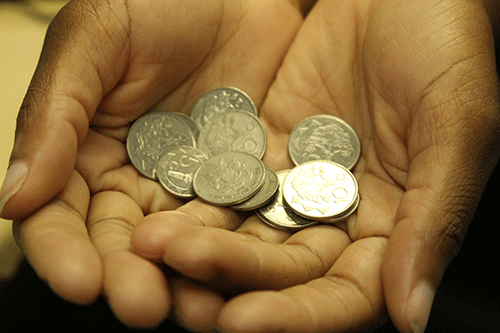The Bank of Namibia has confirmed there is no shortage of coins in the country, and that the local market has been adequately supplied with all necessary denominations. The clarification comes after a local retailer recently requested customers to exchange or purchase goods with coins, specifically 5 cents and 10 cents coins.
However, in response to New Era questions, the central bank stated that lower coin denominations may be under pressure from time to time because Namibians generally hoard these coins due to their low value.
“These coins are significant and useful in a variety of commercial transactions, and the bank thus encourages Namibians to use these coins in their everyday lives,” stated BoN spokesperson Kazembire Zemburuka.
According to the central bank’s 2021 annual report, there are close to N$260 million worth of coins circulating in the domestic economy. This includes N$14.5 million worth of 5 cents coins, N$23 million in 10 cents coins, N$16.8 million of 50 cents coins, N$115 million in N$1 coins, N$71.6 million of N$5 coins and N$16.9 million of N$10 coins.
Meanwhile, Zemburuka emphasised that BoN continues to fulfil this mandate by supplying sufficient and good quality currency in all denominations to the Namibian market.
When questioned about the origin of Namibia’s currency and when the country will be able to print its own notes and mint its own coins, he cited security reasons to keep the information confidential, emphasising that is not for public consumption.
“Information related to the production of currency cannot be disclosed for security reasons in order to reduce risks that may be associated with these operations, in line with industry practice. To summarise, the bank continues to fulfil its obligations by making quality notes and coins available in the quantities required by the market in a cost-effective manner,” Zemburuka reiterated.
Meanwhile, retail insiders explained that some businesses may be experiencing a shortage of coins due to limited banking services, or other disruptions to their value chains.
In addition, the central bank discontinued the minting of 5 cents coins in 2019 due to its low value in the face of ever-increasing inflation. Despite this, the 5 cents coin remains legal tender in Namibia, and by law should be indefinitely accepted as payment at all retailers and businesses.
At the time of the discontinuation, Zemburuka said: “The bank has noted that the handling costs for the N$0.05 cent coin have become exorbitant for commercial banks and retailers. Moreover, the N$0.05 cent coin has a low purchasing power, compared to other denominations in terms of the number of goods or services that a N$0.05 cent coin can buy”.


